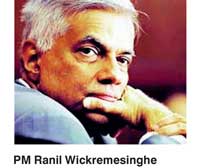Monday Feb 16, 2026
Monday Feb 16, 2026
Thursday, 2 November 2017 00:50 - - {{hitsCtrl.values.hits}}
By Dharisha Bastians
The path to enacting a new Constitution will be a long-drawn and consultative process, Prime Minister Ranil Wickremesinghe told the Constitutional Assembly yesterday, hinting that the timeline for completion of the drafting and voting process could extend till April 2018. 
Prime Minister Wickremesinghe, who chairs the Steering Committee whose Interim Report the Assembly of 225 members was debating for the third consecutive day, took pains to explain to the House that the proposals contained in the report were not final or set in stone. “This report is just to keep the constitutional assembly abreast of proposals under discussion at the Steering Committee. This report contains reflections of those discussions,” the Premier said in his speech in the morning session of the debate.
Wickremesinghe told the House that it was only following this week’s debate on the Interim Report that the Steering Committee will begin to work on the draft Constitution bill that will be presented to the Assembly along with the Committee’s final report.
“It is only now that we will get to work on the final draft proposals. We are not there yet. This report is to seek further views of the members,” he said, in an attempt to allay fears being spread largely by the pro-Rajapaksa Joint Opposition that a draft Constitution would be sprung on the country under the cover of night.
Even once the draft Constitution bill is presented, members will be able to debate the proposals and the Chairman of the Assembly can send the draft back for amendments following those discussions in the House, the Prime Minister assured.
“There are many stages to this. It can’t be done in a hurry. The final report must be prepared and put before the people. The senior Buddhist clergy will have to be briefed on the proposals. All this will be done but it will take time. Maybe even until the Sinhala New Year next year,” he added.
It was not the time yet for battle-cries and slogans, Prime Minister Wickremesinghe insisted. “Let’s first see what the issue is. The war ended but the problem did not. Together let us try and fix the problem. It is not the UNP or the SLFP that is drafting this Constitution. It is the constitutional assembly,” he reiterated. He believed no proposal brought by any party or faction should be dismissed or rejected outright. “Everything should be considered,” Wickremesinghe noted.
Reading from the Joint Opposition proposals for the Interim Report, Prime Minister Wickremesinghe said agreement could be reached on many of the points. “The Joint Opposition says that they agree with the Mahanayakes’ position that a Constitution that will destroy the country should not be enacted, even we agree on that point,” the Prime Minister said, causing the JO benches to erupt in jeers. The disruptions caused the Chairman of the Assembly, Speaker Karu Jayasuriya, to reprimand the JO MPs and threaten to take action against their conduct.
Wickremesinghe told the House that all parties, including the country’s main Tamil party, the Tamil National Alliance, had agreed to try and resolve the national question while ensuring that the territorial integrity and indivisible nature (ekeeyabhavaya) of the state of Sri Lanka is protected. This process also marked the first time that all parties were involved in drafting constitutional proposals, the Prime Minister said. “Before that there were walk-outs and boycotts. I think even we burnt the 2000 draft constitutional package,” he chuckled turning to his UNP colleagues for corroboration.
The 2000 draft constitution bill that the UNP MPs set fire to in the chamber of Parliament, contained devolution proposals put forward by the Chandrika Kumaratunga administration that go far beyond power-sharing proposals contained in the current Interim Report. Political analysts point to the UNP decision to oppose the 2000 draft constitution bill as one of the greatest missed opportunities to resolve the country’s ethnic question in recent times.
Ironically, the UNP opposed the draft bill on the basis of transitional provisions for the incumbent executive President Kumaratunga, rather than over the degree to which power had been decentralised and devolved to the periphery.
Seventeen years later, Prime Minister Wickremesinghe was standing in the same chamber as he told his parliamentary colleagues that future generations of Sri Lankans would thank the current Parliament if they managed to enact this new Constitution which would deliver on equality, justice and prosperity for all Sri Lankans. “Let’s get together and get this done,” the Premier appealed.